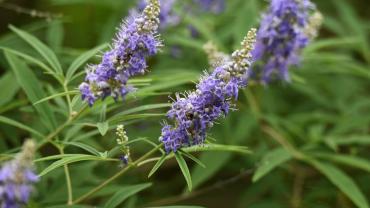
Chaste tree (Vitex spp.) is a botanical that has been used for centuries to support hormonal balance, healthy menstrual cycles, and reproductive health. Laboratory studies have identified over 150 chemical compounds found in chaste tree as potentially health-supportive. Clinical research suggests that chaste tree, particularly the species Vitex agnus-castus, may help support optimal ovarian function, menstrual comfort, and normal endometrial health.
Laboratory studies suggest that several of chaste tree’s constituents may support the inflammatory response. For instance, two bioactive compounds have been shown to potentially help support the preferential inhibition of cyclooxygenase-2 (COX-2). Agnusoside, an iridoid glycoside found in V. agnus-castus has been shown to help modulate lipopolysaccharide-induced nitric oxide production.
Chaste tree may also help promote antioxidative status, cellular health, and the body’s response to certain unwanted microbes. Four flavonoids found in V. agnus-castus have been shown in laboratory studies to promote healthy cellular activity in the presence of P388 cell lines. Other flavonoids and bioactive compounds in chaste tree have exhibited activity against Trichophyton mentagrophytes and Cryptococcus neoformans. Chaste tree may also act against certain unwanted gram-positive and gram-negative bacteria.
Evidence from animal and clinical studies suggests that chaste tree may play a supportive role in hormonal balance. It is thought to help rebalance states of high estrogen dominance that may contribute to certain symptoms associated with premenstrual syndrome (PMS) and polycystic ovarian syndrome (PCOS). Botanical extracts from V. agnus-castus may also increase aromatase enzyme activity and help convert testosterone into estradiol. An animal study involving PCOS models attributed the observed improvement in sex hormone balance to the flavonoids and aromatase enzymes found in V. agnus-castus.
A meta-analysis of double-blind randomized controlled trials investigated the potential link between V. agnus-castus and premenstrual comfort. Three clinical trials involving over 500 participants were included in the meta-analysis. When compared to the placebo group, individuals receiving V. agnus-castus experienced reductions in PMS complaints, including in parameters related to mood, bloating, and lower abdominal pain. The treatment groups were 2.57 times more likely to experience a reduction in complaints than placebo. Drawbacks of the meta-analysis include relatively few included studies, a small data pool, and incongruent study designs. While clinical conclusions cannot be made, evidence suggests that more clinical trials are warranted to further elucidate the efficacy of V. agnus-castus for PMS.
Chaste tree (vitex) is a botanical found primarily in tropical and subtropical regions that may help support menstrual health. It may also help promote a healthy inflammatory response, a healthy response to pain, and antioxidative status.
By Dr. C. Ambrose, ND, MAT